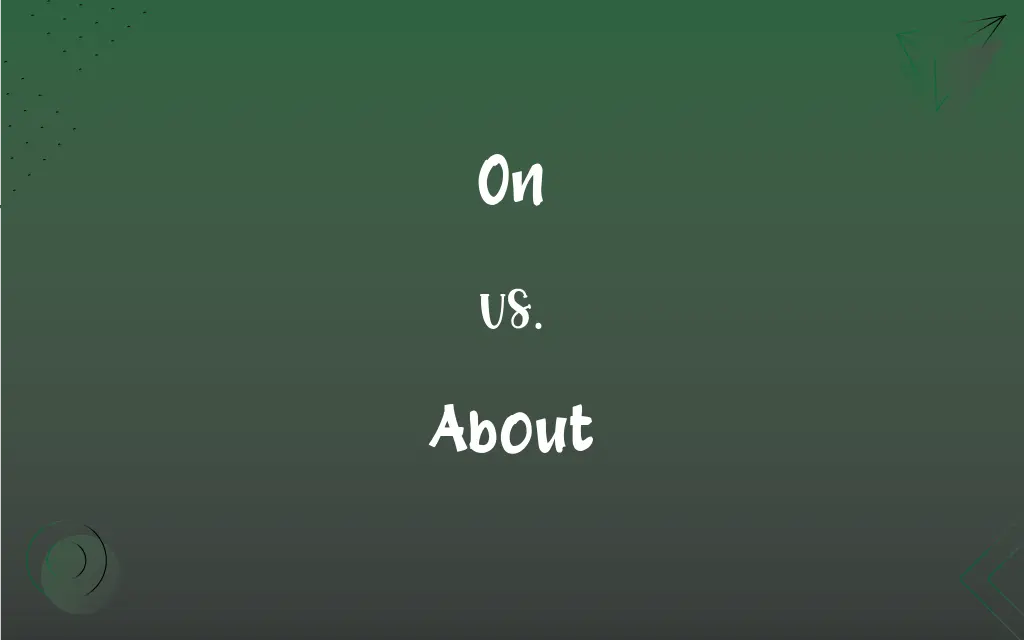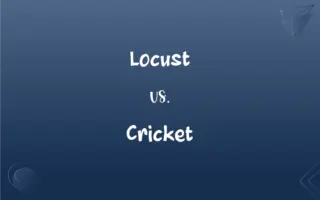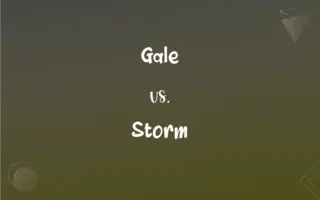On vs. About: What's the Difference?
Edited by Harlon Moss || By Janet White || Updated on November 13, 2023
On" typically indicates a position atop or in contact with a surface, while "about" refers to a subject or topic, or a state of being around or nearby.

Key Differences
The word "on" is primarily used to denote a position atop a surface or in close proximity to something. It implies physical contact or a direct association with a location or object. In contrast, "about" is often used to indicate a subject matter or topic of discussion. It conveys the idea of discussing or referring to a specific theme or issue.
"On" can also signify a state of operation or an active condition, especially in the context of electronic devices or events. This usage highlights an ongoing action or a state of engagement. Conversely, "about" is frequently employed to describe approximate measurements, such as time or quantity, indicating a sense of nearness or closeness without exact precision.
In the realm of scheduling and time, "on" is used to specify particular days or dates, suggesting a precise timing. This precision in "on" contrasts with the more flexible and general nature of "about," which is used to suggest approximate times or durations, providing a sense of estimation rather than exactness.
"On" also finds its use in expressions that signify reliance or dependence, as in trusting someone's word or judgment. In this context, it implies a foundation or basis for something. "About," on the other hand, is used to express movement in the vicinity of an area or object, often denoting motion that is encircling or surrounding.
Comparison Chart
Position
Indicates being atop or touching a surface.
Refers to being around or in the vicinity of something.
ADVERTISEMENT
Subject Matter
Not typically used for topics.
Commonly used to refer to a specific topic or subject.
Approximation
Precise, as in dates or locations.
Indicates approximation or generalization.
Operational State
Indicates an active state, like a device being on.
Not used for operational states.
Movement
Can imply direct engagement or contact.
Often denotes encircling or moving around something.
On and About Definitions
On
Indicating physical contact or position atop.
The book is on the table.
ADVERTISEMENT
About
Referring to dealing with or concerning a subject.
The book is about history.
On
Referring to the medium through which something is expressed or communicated.
The story was on the radio.
About
Indicating a change in direction or orientation.
He turned about and walked away.
On
Denoting the day or part of a day during which an event takes place.
The meeting is on Friday.
About
Indicating movement in or to different directions around a place.
Walking about the garden.
On
Indicating a state of being active, functioning or operating.
The lights are on.
About
Expressing location in a general vicinity.
I left my keys somewhere about here.
On
Indicating dependence or reliance.
He lives on a pension.
About
Denoting approximate quantities, numbers, or extents.
There were about twenty people there.
On
Used to indicate position above and supported by or in contact with
The vase is on the table. We rested on our hands and knees.
About
Approximately; nearly
The interview lasted about an hour.
On
Used to indicate contact with or extent over (a surface) regardless of position
A picture on the wall.
A rash on my back.
About
Almost
The job is about done.
On
Used to indicate location at or along
The pasture on the south side of the river.
A house on the highway.
About
To a reversed position or direction
Turn about and walk away slowly.
FAQs
How is "on" used in communication?
It refers to the medium of communication, like "on TV."
Is "on" used for operational states?
Yes, like a device being "on" means it's functioning.
What does "on" imply in terms of location?
It implies being atop or in direct contact with a surface.
Can "on" indicate a time?
Yes, it specifies exact days or dates.
Can "about" indicate approximate location?
Yes, it suggests a general vicinity.
What does "on" mean in terms of dependency?
It indicates reliance, like living "on" a pension.
How does "about" relate to subject matter?
It refers to the topic or theme of discussion.
Does "about" indicate quantity?
Yes, it refers to approximate numbers or amounts.
Can "on" refer to a basis of action?
Yes, like acting "on advice."
How does "about" express movement?
It denotes moving around or in different directions.
Does "about" relate to exact locations?
No, it's more about general areas or nearness.
Is "about" used for exact times?
No, it suggests a rough estimate of time.
Is "about" used for precise timing?
No, it indicates approximation, not precision.
How is "on" used in terms of events?
It specifies when an event occurs, like "on Monday."
How is "on" used in technology?
It indicates an active or operational state of devices.
Can "on" indicate a method?
Yes, like in "on foot" or "on the internet."
Can "on" be used to express direction?
Not typically; it's more about position or state.
Is "about" used in expressing exact measurements?
No, it's used for approximations.
Does "about" imply a specific point?
No, it's more general and less specific.
Is "about" used to describe precise actions?
No, it's more about general actions or states.
About Author
Written by
Janet WhiteJanet White has been an esteemed writer and blogger for Difference Wiki. Holding a Master's degree in Science and Medical Journalism from the prestigious Boston University, she has consistently demonstrated her expertise and passion for her field. When she's not immersed in her work, Janet relishes her time exercising, delving into a good book, and cherishing moments with friends and family.
Edited by
Harlon MossHarlon is a seasoned quality moderator and accomplished content writer for Difference Wiki. An alumnus of the prestigious University of California, he earned his degree in Computer Science. Leveraging his academic background, Harlon brings a meticulous and informed perspective to his work, ensuring content accuracy and excellence.































































